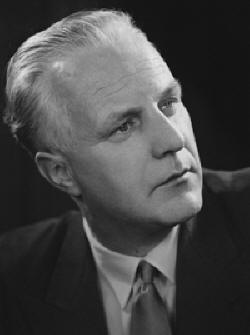

Queer Places:
Hans Schaeuble Foundation, Zähringerpl. 6, 8001 Zürich, Switzerland
 The Swiss composer Hans Schaeuble (May 31, 1906,
Arosa - December 19, 1988, Zurich),
a married gay man who thought masculinity creative and therefore feared his
own feminine element, made an opera of The Picture of Dorian Gray (1947–48).
The Swiss composer Hans Schaeuble (May 31, 1906,
Arosa - December 19, 1988, Zurich),
a married gay man who thought masculinity creative and therefore feared his
own feminine element, made an opera of The Picture of Dorian Gray (1947–48).
Hans Joachim Schaeuble was a composer born the son of German parents (St. Blasien and Warnemünde) on May 31, 1906, in Arosa and died on December 19, 1988, in Zurich. His father, Dr. Alfred Schaeuble, was a chemist whose prosperity in Arosa enabled his son to lead a carefree later life. Hans Schaeuble initially attended the canton school in Trogen and then in Lausanne where he completed his undergraduate education, studied one semester at the university and lived until 1926. Performances of mostly French music (including Strawinsky) by the 'Orchestre de la Suisse Romande' under the direction of Ernest Ansermet (1883-1969) awoke in Schaeuble the desire to compose. Following auto-didactical studies he relocated to Leipzig in 1927 in order to attend the conservatory. There he studied composition under Hermann Grabner (1886-1969) who had been the professor for composition in Leipzig since 1932. His piano teacher was the educationalist Carl Adolf Martienssen (1881-1955). Hugo Distler (1908-1942) and Wolfgang Fortner were amongst his fellow students. Schaeuble, although still studying, pursued an ambitious project to produce an opera after Theodor Storm's 'Dagmar', op.2. His first concert at the provincial conservatory and on the radio with the piano music 1929 (op.5) suggested a promising musical career. Further concerts followed in 1932, for instance at the 'Schweizerischen Tonkünstlerfest' (Swiss Musician's Festival) in Vevey, Switzerland and met with admirable success.
In 1931 Schaeuble relocated to Berlin where he met Helene Höhener whom he married in 1937, however Mrs Schaeuble died just one year later of breast cancer. Schaeuble's homosexual tendencies were suppressed during his marriage to Helene, such that the risk of exposure under the National Socialist regime was slight. Schaeuble appeared to have little interest in politics, his main worries revolved around his work. His first compositional success in concert halls and on radio was confirmed by a publishing contract from Bote & Bock who, in the following years, published Schaeuble's op. 18 to 23 and, post war, op. 38 and 39. He achieved further success in Berlin with, for example in 1934, the chamber musical evening of the Swiss Club in Berlin. The 'Lutz-Quartett' of Winterthur interpreted the works op. 19, op. 5 and op. 13 and the German press reacted, on the whole, positively to Schaeuble's work. His Symphonic Music for a Large Orchestra op. 22 was performed for the first time by the Berlin Philharmonic Orchestra under the direction of Carl Schuricht in March 1939. Schaeuble returned to Switzerland as a result of the increasing risk of war (with the general mobilisation of troops on August 29, 1939) only to return again to Berlin in the summer of 1941 and finally leaving for good in the Autumn of 1942. At the end of the war the long residency in Berlin contributed to repeated reproaches inflicted on Schaeuble that he had been 'too German friendly' during the Third Reich.
Schaeuble's occupation as a composer decreased and he was no longer able to rely on his pre-war success, nevertheless his Symphony op. 25 was world premiered in Winterthur by Hermann Scherchen in 1945. He did, however, have to tolerate numerous rejections including those from Volkmar Andreae and Radio Bern. It became obvious that Schaeuble no longer felt comfortable living in Switzerland, he blamed a conspiracy against him for his asserted misfortune. Indeed this speculation was confirmed in the statement by Hermann Scherchen that 'one can not perform the works of Schaeuble as he was a Nazi.' Schaeuble sued for libel and won the case. He realised the opera Dorian Gray after Oscar Wilde in 1947/1948, a large project for which Schaueble found no suitable stage; there was no question of it being performed on a provincial stage which was the only offer he received. The work was not performed until its world premiere at the opera house of the University of North Texas in Denton on February 6, 2004. The piano concert op. 34 from 1949 and op. 18 both deal with dodecaphony but in a very superficial manner. His later years were occupied with the meticulous reworking of his earlier works, there exist no original compositions from this time. The Hans Schaeuble Foundation, dedicated to the furtherance of young musicians and musicologists and to the care of the benefactors own musical works, was founded in 1988 following his death.
The Hans Schaeuble Foundation Zurich has been supporting the Arosa Kultur association and its activities for a long time. In particular, the foundation is concerned about the promotion of young musicians as well as chamber music ensembles. The Hans Schaeuble Award, which was awarded for the first time in autumn 2015, now makes this support visible.
My published books: